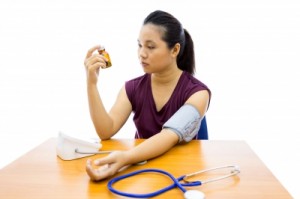High Blood Pressure? 10 Factors that can elevate it at the Doctors office!
10 Factors That Can Increase Your Blood Pressure ~ At Your Doctor’s Office
Have you visited your doctor’s office and were shocked to find that your blood pressure was high? It happens to many individuals. What most do not realize is that our blood pressure is in a constant state of flux depending upon our moods, activities and what we have consumed. The truth is that simple things can cause our blood pressure to fluctuate between 5-40 mmHg. Our blood pressure reading is just a snapshot of that particular moment and we must take into account various factors that could influence it.
Here is a list of 10 factors that can cause an elevated blood pressure. They include:
- Blood Pressure Cuff Size (1,3,4) – Proper cuff size is crucial for an accurate reading. Studies have revealed that a too small of a cuff can increase the systolic pressure from 10-40 mmHg.
- Not Relaxed (3,4) – Being relaxed and at rest is another important factor that can affect your blood pressure reading. You should sit relaxed and calm for up to 5 minutes before your blood pressure is taken. Physical activity can increase your systolic reading from 10-20mmHg.
- Unsupported Body And Arms (1,3,4) – When your blood pressure is taken, you should be seated in a chair with proper back support. Legs uncrossed with feet flat on the floor and arms supported. An unsupported back can increase blood pressure by 6 mmHg and crossed legs can increase pressure by 2-8 mmHg.
- Using Cuff Over Sleeves (1,3,4) – The blood pressure cuff should always be directly on the arm, not over the sleeve. Clothing can affect the systolic reading from 10-50 mmHg.
- Talking During The Reading (1,2,3,4) – Talking during the blood pressure test can affect the reading from 10-50 mmHg.
- Your State Of Mind (5,6) – Being stressed can result in a large increase in your blood pressure. Sometimes the cause is even the visit to the doctor’s office!
- Temperature (4,5) – When we are cold, our blood pressure tends to increase. If you are cold while at the doctor’s office (especially in the nice paper examination gowns) if could result in an elevated reading.
- Smoking (1,5,6) – Nicotine temporarily increases blood pressure, regardless of the form of consumption. Refrain from smoking at least 30 minutes prior to your blood pressure measurement.
- Caffeine And Alcohol (4,5,6) Both caffeine and alcohol results in a spike of blood pressure. Refrain from consuming either at least 30 min prior to your blood pressure measurement. Remember, many energy drinks are high in caffeine.
- A Full Bladder (1,3,4) Yes, a full bladder can increase your systolic blood pressure from 10-15 mmHg! Make sure you go to the restroom before your blood pressure measurement.
As you can see, there are a lot of factors that can result in an increased blood pressure measurement. Combine one, two or three of them and you can end up with quite a high false reading! Unfortunately, this then gets documented in our charts and the next step is a prescription of some type of drug.
The best solution is to control the factors you can: no alcohol, caffeine, and nicotine prior to the test. Make sure you are relaxed, go to the bathroom, be quiet and insist on being seated appropriately and the cuff on your arm. If it is still high, insist on repeated measurements before you accept a high reading.
- Handler, Joel. The Importance of Accurate Blood Pressure Measurement. The Permanente Journal (2009) 13:3: 51-54
- Long, JM., J.J. Lynch, N.M Machiran, SA Thomas, KL Manilow. The effect of status on blood pressure during verbal communication. Behavior Science (2004) 5:2: 165-172.
- O’Brien E, R. Asmar, L Beilin, Y Imai, J. Mallion, G. Mancia, T. Mengden, M. Myers, P. Padfield, P. Palatini, G. Parati, T. Pickering, J. Redon, J. Staessen, G. Stergiou, P. Verdecchia. European Society of Hypertension recommendations for conventional, ambulatory, and home blood pressure measurements. Jounral of Hypertension (2003) 21: 821-848.
- Pickering, T.G., J.E. Hall, L.J. Appel, B.E. Falkner, J. Graves, M.N. Hill, D.W. Jones, T. Kurtz, S.G Sheps, E. J. Roccella. Recommendations for Blood Pressure Measurement in Humans and Experimental Animals: Part 1: Blood Pressure Measurement in Humans: A Statement for Professionals From the Subcommittee of Professional and Public Education of the American Heart Association Council on High Blood Pressure Research. Hypertension (2005) 45:142-161.
- http://www.faqs.org/nutrition/Hea-Irr/Hypertension.html
- http://www.infobloodpressure.com/factors-affecting-BP-readings.html

